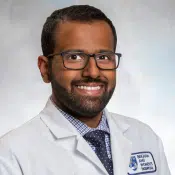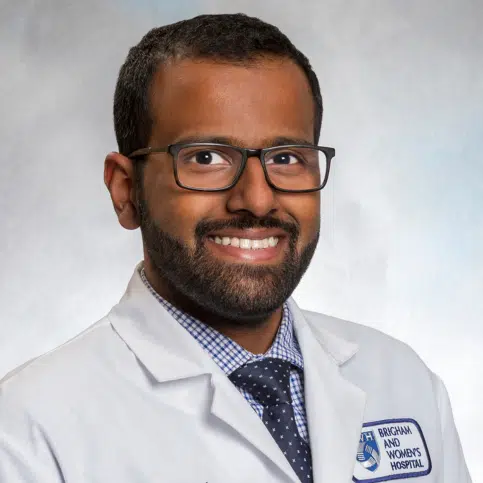Researcher Spotlight: Vignesh Shanmugam, MD
BRIGHAM AND WOMEN’S HOSPITAL, INC.
Tom Condon Family Fellow

In many types of lymphoma, such as follicular lymphoma (FL), tumor cells are embedded in a rich microenvironment of non-malignant cells with which they regularly interact. The nature of these interactions has not been well studied, though, and Dr. Shanmugam is fascinated by what these mysteries could mean for lymphoma treatment. “Do these immune cells support the growth of lymphoma cells?” he asks. “If so, what are the molecular mechanisms, and how can we target these mechanisms for therapeutic effect?” To answer these questions, Dr. Shanmugam’s research is aimed at using cutting-edge genomic techniques to characterize the non-malignant cells in the FL microenvironment, including their molecular makeup and how they relate to disease aggressiveness. “I will also leverage artificial intelligence tools to identify the molecules produced by nearby non-malignant cells that drive the growth of malignant cells,” he adds. “This understanding can lead to new tests to correctly diagnose and treat patients with the most aggressive form of FL early.”
Dr. Shanmugam is a postdoctoral researcher at the Broad Institute of MIT and Harvard in Massachusetts. He earned his medical degree from Weill Cornell Medical College in Qatar and completed a clinical fellowship in hematopathology at Brigham and Women’s Hospital at Harvard Medical School in Boston. With the support of the Foundation’s postdoctoral research fellowship, he hopes to establish himself as an independent investigator in the field of lymphoma research. “Our field is at a critical inflection point when we can directly observe and manipulate lymphoma cells and the cells that support them at a molecular level,” he says. “These technologies are poised to transform our understanding of the fundamental mechanisms of lymphomagenesis and pave the way for developing mechanism-based therapies. It is an incredibly exciting time to be a scientist and lymphoma researcher.”
Dr. Shanmugam’s commitment to lymphoma research is also driven by the people he sees in the clinic. “The patients I care for are my most important source of inspiration,” he says. “They constantly reinforce my commitment to science and lymphoma research. It’s immensely gratifying to channel this inspiration to generate new knowledge that has the potential to make a direct impact on lymphoma patients.”


